Listen:
Scroll down for a transcript, video, how to subscribe, and more
Episode Synopsis:
Welcome to Episode #64 of Habitual Excellence, presented by Value Capture.
Joining us today as our guest is Theresa Brown, PhD, BSN, RN. She is a nurse and writer who lives in Pittsburgh. Her third book — Healing: When a Nurse Becomes a Patient — is available now. It explores her diagnosis of and treatment for breast cancer in the context of her own nursing work. Her book, The Shift: One Nurse, Twelve Hours, Four Patients' Lives, was a New York Times Bestseller.
Theresa's BSN is from the University of Pittsburgh, and during what she calls her past life she received a PhD in English from the University of Chicago.
Today's episode is the first part of a two-part series with Theresa. Come back in two weeks for the next part in Episode #65.
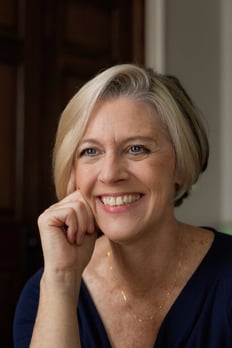
In today's episode, Theresa talks about the need to improve healthcare for the sake of patients and for caregivers. How did Theresa's view of healthcare change when she became a breast cancer patient?
Host Mark Graban also asks Theresa questions and discusses topics including:
- Is there sometimes an "empathy gap" in healthcare?
- Making things easy for patients is not currently a goal of healthcare?
- It sounds like nobody was coordinating (or explaining) your overall cancer situation? Why did you feel "left in the dark?"
- Did caregivers know you were a nurse? Were you treated differently?
- “This job would be easier if there weren’t such a narrow divide between being the canary in the coal mine and Chicken Little" -- is there an empathy gap toward nurses and other caregivers?
Click to visit the main Habitual Excellence podcast page.
Video:
Quotes:
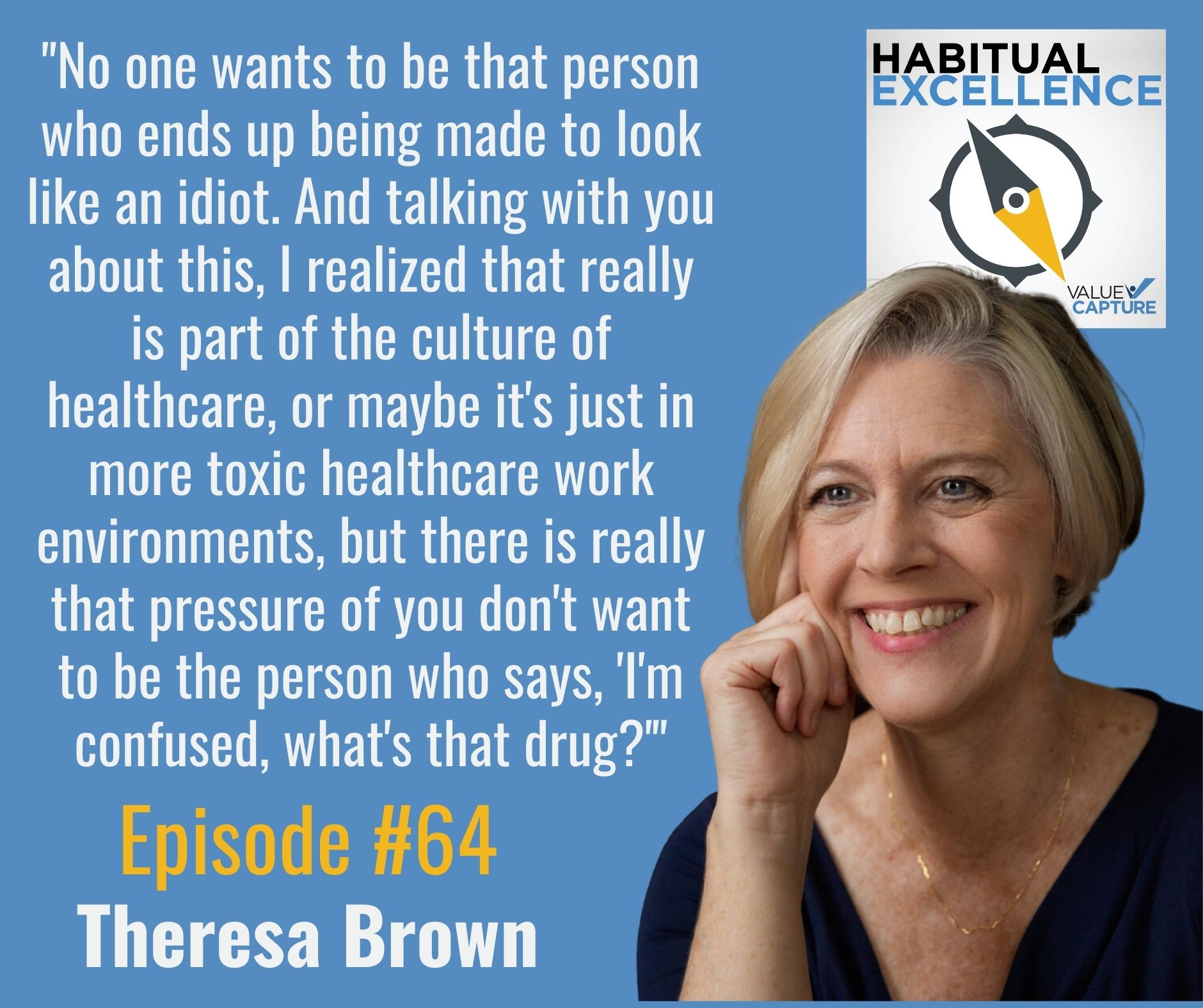
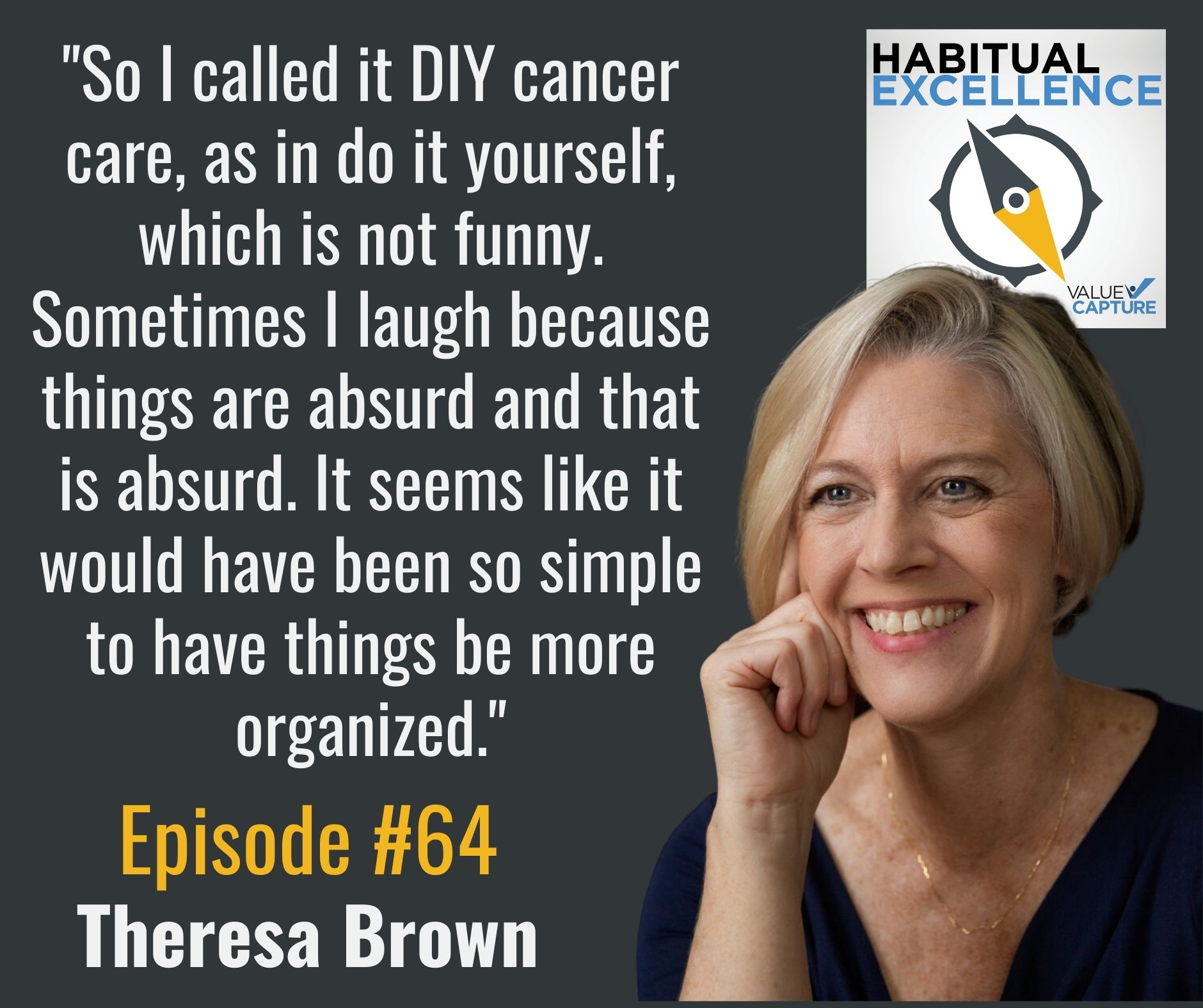
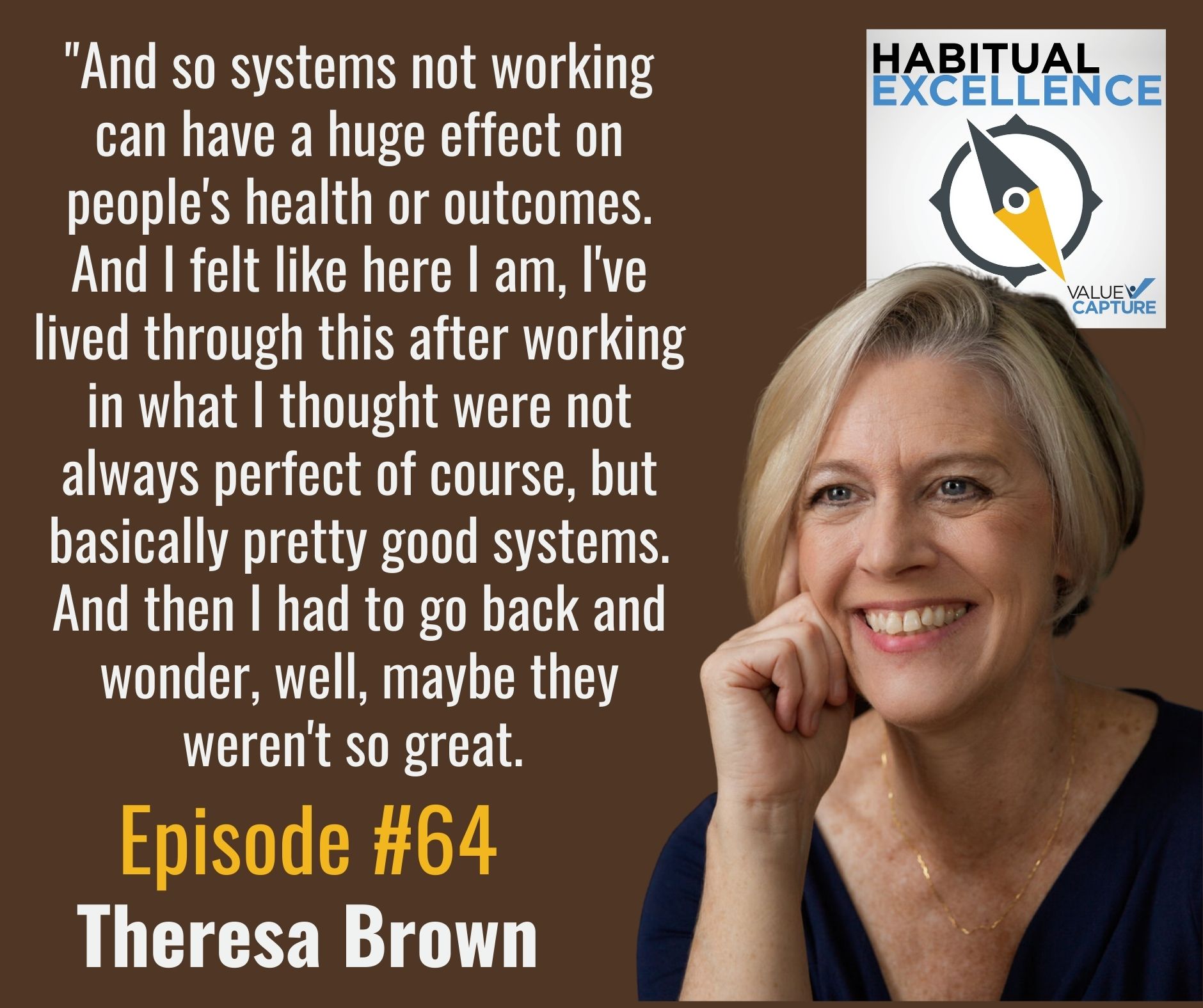
Subscribe:
To make sure you don't miss an episode, be sure to subscribe today! Please rate and review the podcast.
Automated Transcript:
Mark Graban (2s):
Welcome to Habitual Excellence presented by Value Capture. This podcast, and our firm, is all about helping you and your organization achieve habitual excellence. Be a one unifying focus, one value based structure and one performance system. In other words, it's about helping you capture dramatically more value through achieving perfect care and perfect safety for patients and staff. To learn more about Value Capture and our services visit www.valuecapturellc.com. I'm Mark Graban here. Real quick. We haven't done this before, but we had such a great discussion with our guest today.
Mark Graban (42s):
Theresa Brown, we talked for an hour. We're going to break that up into two parts for the first episode here today will be about 29 minutes. And we'll be back again in two weeks with the next installment, another 31 minutes or so. So here is today's episode. Well, hi, everybody. Welcome to habitual excellence. Our guest today is Theresa Brown. She is a nurse and writer who lives in Pittsburgh. Her third book, it's titled I'm going to hold a copy up for those who are watching on YouTube it's Healing: When a Nurse Becomes a Patient, is available now April 12th, 2022, the book Healing explores her diagnosis and treatment for breast cancer in the context of her own nursing background, her previous book, and this was my first introduction to Theresa was her book, The Shift: One Nurse, Twelve Hours, Four Patients' Lives.
Mark Graban (1m 37s):
It was a New York times bestseller. So Theresa has got a really, I think, unique background. She has a BSN from the university of Pittsburgh and during what she calls her past life, she received a PhD in English from the University of Chicago. So maybe that explains the writing aptitude. Her website is TheresaBrownRN.com. There'll be links to the books and all of that in a website. So Theresa, thank you. Thank you so much for being here today. How are you?
Theresa Brown (2m 7s):
Oh, you're welcome. And I'm good. And I'm so glad to be here.
Mark Graban (2m 11s):
Oh, I'm very excited to talk to you because you know, I think there's a lot to explore from, from both books. You know, the, the new book I think is interesting because you do go back and forth and talking about past experiences, even referencing the shift and bringing in other, other stories as, as talking about your, your treatment for cancer. So I asked how you're doing today, but, but also I think importantly, how, how, how, how is your journey back to health?
Theresa Brown (2m 41s):
Yeah, I would say good except that as people will learn, if they read the book, it wasn't, well, there was treatment my treatment for cancer. So I had a small, very treatable, breast cancer. I didn't need chemotherapy. I had a for surgery and then radiation, but then took Tamoxifen, which you may know of men, most women who get breast cancer end up taking some kind of anti-estrogen drug afterwards. So I went on Tamoxifen and Tamoxifen basically ruined my life. Just, I mean, tired all the time.
Theresa Brown (3m 22s):
I was confused and I didn't really realize till I went off it, which is another long story, how bad it had been that I had just, wasn't a real version of myself. So it's, it's a very strange thing to have treatment, be like that. And then be on this medication where I would go to my appointments and they would say, how are you? How's the Tamoxifen? I'm tired. I've got brain fog. Oh, okay. And it was like checking off a box. And then once I went off it, I thought, gosh, this is, this is terrible. But I had told myself, I am going to take the, because I don't want to have a recurrence and then have to tell my kids, well, I just couldn't tolerate Tamoxifen sort of that toughness that healthcare people have, right?
Theresa Brown (4m 15s):
Like I can do this no matter what. And then the sort of long story about why I went off it. And then I realized, oh, I'm now one of the 50% of women who don't take Tamoxifen for all five years. So I'm not now on any medications and am just now slowly, slowly, slowly starting to really, really feel like myself again in terms of energy. And it's, it's a, it's a very, it's a very weird thing, but I feel good overall is the bottom line.
Mark Graban (4m 52s):
Well, I'm glad to hear that. I mean, a book is a serious undertaking, so I I'm, I'm, I'm, I'm glad your energy and lack of brain fog allows you to complete this and get it out to market. So again, congratulations on the,
Theresa Brown (5m 11s):
Thank you. And yeah, and I only told that story in such detail for clinicians, because I think people get used to hearing I'm having this problem, that problem. And they're not really listening that well. And as you know, because you read the book, but for people who haven't read the book, my diagnosis treatment, everything was a constant learning of how we are just not there for patients. And a lot of what I do in the book is reflect on that. So we, I treated bone marrow transplant, patients, sickest patients in the hospital. They go home with a Hickman catheter, a three-prong IV catheter, that's attached to their chest.
Theresa Brown (5m 56s):
And I never thought about what, what must that be like to go home with this device that hangs off your body, that you can't take a shower. Normally you have to constantly worry about it getting infected. You have to have the dressing on, it changed all this stuff. And I just never gave it a thought it's well, we're saving your life. That's part of treatment. And that's a lot of what the book is about is how can we bridge that gap between clinicians having tasks and work, but then patients being terrified and inconvenienced and incapacitated and to a level that the clinicians, a lot of the time don't get.
Mark Graban (6m 44s):
Yeah. Well, and you w you write a lot about the need or the opportunity for empathy and compassion. So I was trying to elaborate on that, like the task oriented nature of a nursing shift, or even your experience as a patient, when they asked you how you were doing, you said it was like they checked the box. It sounds like maybe, maybe first off in that situation, that there was a bit of an empathy gap about your response or how you were doing as a person.
Theresa Brown (7m 16s):
Yeah. And the thing that struck me the most was I, I have a lot of cancer in my family. I'd taken care of cancer patients. It's in cancer patients die. I thought, okay, I got this, you know, like, I know what this is like being diagnosed with cancer. And I, I only say I had a small, very treatable tumor to make clear that no one was saying, if you don't get this treated right away, you're going to die like with our leukemia patients. But I was absolutely terrified. It's a terrifying diagnosis. And I don't know that I ever got that from the patients I took care of.
Theresa Brown (8m 2s):
You know, I, at some level I knew that. And the other reality is you can't go to work constantly a hundred percent empathizing with people's fear and terror, because then nothing would get done. Right. But at the same time, there has to be more of an understanding than I had or than I think any of us had of what these people emotionally are going through. And then I became one of these people and there was just, I don't want to say no recognition of that. Let's say very little, very little recognition of that.
Theresa Brown (8m 43s):
So one of the stories I tell them, the book is I got diagnosed after a follow-up mammogram and ultrasound. They said, you're not going to leave the hospital today without an, for a biopsy. So I had the scan, they wanted to do another mammogram. I talked with the doctor, they showed me my mammogram all while like tears one after another, just kept falling down my face. Finally, I went out, sat where I was supposed to sit to schedule a biopsy. And there was no one there to help me. And I'm sitting there, you know, stains of tears all over my face, I'm slumped over.
Theresa Brown (9m 26s):
And someone came by and said, oh, she leaves at three. You just missed her. And it made me so angry, just this casualness, like I was scheduling a manicure or something And not seeing, because I'm sure I presented as someone bereft, which is how I felt terrified in need of compassion. And it was also exactly three on my watch. So, you know, normally I would say somebody wants to knock off a few minutes early.
Theresa Brown (10m 11s):
Okay, I get that. But the, there must not have been any communication about, oh, we have someone coming who really needs to schedule a biopsy or that communication did come through. And the person felt like I'm just going to leave anyway. I've no idea what happened, but the point is even that was not a smooth system. And it's so important because the other thing I wonder is what if I hadn't been me and called the next day and insisted on the earliest appointment possible would have been one of those people who's quote, lost to follow up, you know what, I've waited a month to go back in and who knows what would have happened to my cancer by that?
Theresa Brown (10m 53s):
And so systems not working can have a huge effect on people's health or outcomes. And I felt like here I am, I've lived through this after working in what I thought were not always perfect of course, but basically pretty good systems. And then I had to go back and wonder, well, maybe they weren't, maybe they weren't so great.
Mark Graban (11m 25s):
Well, and you write about, is I think you're touching on here at times, feeling left in the dark as a patient. And there was a situation where you w w when you miss, where, when this person left, is that when you were left, waiting over the weekend for the results of your cancer test, or was that just a different delay?
Theresa Brown (11m 46s):
That was a different, yeah. Where I actually didn't end up waiting because my PCP, the results that I left after the biopsy being told, you know, it's just, it's bizarre. You think here's someone comes in for a biopsy. They want to know what am I going to get my results. Right. And instead of, and I hated that this was a nurse, but it could have been anyone. Right. But I want know, I want, I want nurses to all be great, but instead of emphasizing ones, the earliest, you could get your results or, oh, you know, we've streamlined our systems.
Theresa Brown (12m 28s):
So you'll get them within two days. It was her emphasizing what to me sounded like, well, you probably won't get these till Monday. And it was a Tuesday before when I'd had the tests. So I J I don't like to me, that's cool. You know, if there's a reason that a test needs to take that long, I can understand that, but she explained it more as just a kind of paperwork issue and kept saying my radiologist. And I thought your radiologist, isn't it, my right Patient.
Theresa Brown (13m 9s):
So it was this bizarre sense of who owns the care, who owns the information. And in that instance, it was clearly not me, but luckily I had a great primary care doctor and I called him and said, Hey, they're saying this is going to take over the weekend. Can you find out for me? And the next day he, he found out and he called and told me,
Mark Graban (13m 37s):
Yeah, <inaudible> talk about that. Or that orientation of them describing their radiologists, instead of being your radiologist, who's being of service to you. I mean, you've probably seen in different cities, you might see a billboard where a hospital is bragging about patient-centered care and affects the question. Like, why is that so noteworthy, why, why, what else would it be? But you, you, you, you, right in the epilogue, I was going to ask you about this. You know, you said making things easy for patients is not currently a goal of, well, let's, let's, let's talk about, you know, the, the, the American healthcare system.
Mark Graban (14m 20s):
I mean, was it, was it a case that nobody was coordinating? Like, would you describe your care as fragmented? Where, like, who is the oncologist supposed to be coordinating the entire treatment experience, or did it not work out that way?
Theresa Brown (14m 35s):
That is a great question. And I think that was what my primary care doctor thought would happen. Cause he said, you want to get a medical oncologist right away. And I thought that makes sense, but I couldn't even see that person till had seen the surgeon and had the surgery. So there wasn't anyone coordinating my care, except for me and my husband, when at points, I would have him step in because even though I was essentially doing my job for myself, I maxed out sometimes on my frustration. And then he would step in for me. So I called it DIY cancer care, as in do it yourself, which is not funny.
Theresa Brown (15m 19s):
Sometimes I laugh because things are absurd and that is absurd. It seems like it would have been so simple to have things be more organized. And it just was not a priority for the system to do that, even though it's, oh, we're a cancer center, but I th I had no idea what that meant. And then I started to wonder, well, is that just a billing thing? Can you charge more if you're called the center? Even if you're, the care is exactly the same, not being a center,
Mark Graban (15m 57s):
Or even having all of the fragmented, if it's fragmented, the fragmented pieces, all in the same building doesn't necessarily mean it's any less fragmented. I've seen situations where patients are having in the course of a days visit to stand in multiple lines, to register in different places. Like how does the hospital not know you're already there, you checked in on a different floor for a different part of care. And now you're standing in another line. It seems a thoughtless, thoughtless, or cruel.
Theresa Brown (16m 28s):
That's exactly right. And a very good friend who was diagnosed a few with breast cancer a few months before I was, would go to another facility here in Pittsburgh. And even she would be on one floor and get things done. And then the next floor, the next floor to turn in all the same information. And she said, I just did all this. And they said, well, they're on a different computer system. And yeah, just, I, I think it's so hard for administrators probably like, so while you fill out your name and your history, and, you know, I probably would've would not have seen how oppressive that feels myself.
Theresa Brown (17m 17s):
I might've said, wow, this is really inefficient. Can't we do better, but I, I wouldn't have understood that it has this emotional layer that it's sort of like, you know, ripping off a band-aid every single time that you have to sit there. And when you got diagnosed, what your diagnosis was, what your treatment was, and it just shouldn't be like that. Right. And so for me now, also every time I go for a mammogram, I have to fill all that out by hand. And I say to them, because, oh, I've always been that way. I'm not even more that way. I say, why, why, why can't you get this off the computer you have?
Theresa Brown (17m 60s):
And also what's going to be more accurate. I hope this isn't always true, but a record that's been curated that people have had a chance to correct. Or me sitting there irritated with the TV on some dumb talk show, which is not that talk shows are dumb. I just, I just really don't like having TVs on when I'm at appointments and, and having to fill all this out. Yeah. Yeah.
Mark Graban (18m 30s):
So as a nurse who worked in oncology, I'm, I'm curious on different levels, how that affected your care journey, you know, did, did caregivers know you were a nurse or were you treated any differently because of that, the way they talk to you or anything?
Theresa Brown (18m 50s):
Some people didn't know, and they really didn't talk to me that differently, which was in some sense, good. Maybe because it's nice to just be a patient, but on the other hand, it seemed like everyone got the same spiel and had a sort of presume level of understanding. And I actually ended up switching medical oncologists because of this issue I alluded to with going off Tamoxifen and, you know, along maybe not that interesting story to, to a lot of people, but, and the new medical oncologists seem to get a lot better that, oh, this is someone who knows this field.
Theresa Brown (19m 41s):
Who's maybe if we talk about something, that's going to pull up an article about it and read about that. And I appreciate that. Not that I wanted them to assume, oh, you understand all this, so we don't need to explain anything to you. That's not the point.
Mark Graban (19m 58s):
That might be a bad assumption, even with your experience.
Theresa Brown (20m 1s):
Exactly. Right. Exactly. And that was the other weird thing that happened is once I was diagnosed, I didn't work a lot with breast cancer patients. Or unfortunately, if I did, it's the people who were dying essentially, but I forgot almost everything I'd ever learned about breast cancer. Oh, staging. What is that? Which was very unsettling and lucky for me. I have friends in healthcare. So I called my friend, who's a breast surgeon and went through my pathology report with him and, you know, but a lot of people don't have those resources, but I, so I think for me, it was kind of a weird mix of, I lost touch my professional self.
Theresa Brown (20m 51s):
And then at the same time, I was often being talked to like, oh, this is very, very basic and this, and then this, and then this. And so I guess that's impersonal.
Mark Graban (21m 5s):
Yeah. So you, you, you talked, you know, we we've talked Theresa about the opportunity for caregivers to have more empathy and compassion for patients. I think there's, there's also an opportunity. I think you wrote, you wrote about this in the shift, especially the opportunity to have empathy toward caregivers and what they're having to go through as the book. So vividly portrays you, you, you, you wrote, this was one of the things I highlighted in the shift. I wanted to hear your, your comments behind this quote, this job nursing, it would be easier if there weren't such a narrow divide between being the Canary in the coal, mine, and chicken, little it talking about like, what, what is worth speaking up about in your attempts to provide better care and to improve things for patients?
Mark Graban (22m 1s):
Tell, tell us more about that. If you would.
Theresa Brown (22m 4s):
Yeah. That is a great question. So it, that that point really comes home when you're debating whether to call a code on a patient, whether they're calling a rapid response team. I mean, sometimes it's obvious that that's what has to happen, but times when it's not so obvious, there's always a feeling of, do I need to call this code? What's really going on here? Is this something really serious? Or should I be able to handle this myself and baked into that is there's no sense of isn't it better to try and do more?
Theresa Brown (22m 51s):
And if it wasn't needed, maybe we could debrief and talk about that instead. It's all on the nurse. I mean, I, I always felt like every time there was a code, there should be a debrief and there was never a debrief, never to talk about what was going on and what was your decision-making process? You know, what else were you thinking about this? Did you call in anyone else? What, what else might've happened? None of that. And so I remember at one point when I was working bone marrow transplant, there was a feeling after a code among the intent, one of the intensivist who was there was that we didn't know how to handle codes.
Theresa Brown (23m 32s):
And so there was some training, but even that was a very ad hoc and not everyone got it. And it's so bizarre me how there are so many standards in healthcare, right? There's so many demands from insurance companies from CMS, probably from HHS, you know, whatever, everyone knows what this stuff is. Right. And yet the, the standardization of let's think about what happened, which I know you guys have Value Capture are so good at that's what you're trying to teach people. Let's think about what happened. How can we try and standardize it?
Theresa Brown (24m 15s):
Not just because standardization can help improve quality, but because it helps staff to not feel like, oh right. Am I being the Canary in the coal, mine, coal mine, and saying, we have a real problem here. Or are you running around? Oh, my patient had a stroke. My patient had his stroke when they actually are fine, which didn't happen to me, but happened to another nurse. And nobody wants to look foolish, especially because then there's a kind of, oh, you don't know what you're doing.
Mark Graban (24m 53s):
It seems like, like from a patient perspective, I would want you to err, on the side of my, my, my safety, like if, if in doubt, call a code and I realized that that can be disruptive and that's gonna pull other people in. I mean, I, it, but when it comes to that idea of speaking up, whether it's calling the code or speaking up about a process problem of like, well, should I speak up about it so we can fix the process or do I just work around it? You know, there's maybe that layer, but you know, I've, I've had the chance to sit in on training on a process called TeamSTEPS. I don't know if you're familiar with that, but it's used a lot of it comes, actually draws on aviation safety practices from the cockpit as applied to the operating room.
Mark Graban (25m 41s):
And, and in that training, they try to encourage, or they do encourage or staff nurses or whoever is there, if in doubt, speak up and to frame it as I have a concern and state the concern. Now, part of the culture and the response from the surgeon needs to be not annoyance that you're speaking up, not frustration that you're slowing things down. And even if that concern turns out to be unfounded, speaking up about the concern, like it gives an opportunity to learn or debrief for, you know, I think it's interesting where there's that culture. And, you know, we find a lot of inspiration and toy from Toyota where they have a culture.
Mark Graban (26m 23s):
That's very clearly if in doubt, speak up, if in doubt, stop the assembly line. And if, if there's a concern, that's not really a serious concern, then that stoppage is momentary and life goes on and maybe it's a learning moment. So I think it's interesting to think about how those mindsets translate from two very different settings in, into helping people in healthcare.
Theresa Brown (26m 47s):
Right? And you talking to his name, making me think of this, to bring in something pretty explosive, this, this nurse in Nashville, who was just convicted of and ended up being what negligent homicide, which is just sending these ripple effects of intense fear and anxiety through everyone working clinically, which I'm not right now. I'm just hearing about it from people and yeah, the, the whole lack of systemization basic safeguards, you know, it was her mistake. I agree it's appropriate. She loses her license because it was a really bad mistake.
Theresa Brown (27m 29s):
But on the other hand, such basic things like if people don't know the story, she ended up taking a paralytic out of a Pyxis machine instead of an anti-anxiety alytic. But the computer only required typing in two letters of the drug to do the override. You know, if it had required three letters, the mistake would never have happened. And it's, I feel like that's the kind of thing where you can't say, oh, in hindsight. Yeah. We see like, no, that should have been obvious 10 years ago that that needed to be in place. So yeah. I mean, I know that so much of what Value Capture is doing and why I am so interested in your work is try and put those safeguards there so that yeah.
Theresa Brown (28m 24s):
Everyone's feeling like, oh, I can stop the assembly line and it's not going to be like, you thought that, I mean, because no one wants to be that person who gets, it ends up being made to look like an idiot and talking with you about this, I realized that really is part of the culture of healthcare, or maybe it's just in more toxic healthcare work environments, but there is really that pressure of you don't want to be the person who you thought that, you know, rather than saying, I'm confused, what's that drug, I'm confused. Why are we doing this? And very, very simple example, once I was still a pretty new nurse and I saw that somebody had ordered what's that x-ray called, it's like a dental.
Theresa Brown (29m 13s):
X-ray where they do. You're like a 360 of your mouth. Right. And I thought that is so weird. Why is this being ordered for my patients? So I could have sent the patient to the dental extras. I don't even know we did them in the hospital, but anyway, so I called the dentist that I don't understand the person who put in the order, why we're doing this. He said, oh my God, I put it on the wrong patient. It's no harm
Mark Graban (29m 41s):
Spoke up
Theresa Brown (29m 41s):
Right. Exactly. Exactly.
Mark Graban (29m 44s):
Well, thanks again to Theresa Brown for being our guest today, we had such a great conversation. We talked for a little over an hour, so we're going to bring you part two of that conversation in our next episode, here on habitual excellence in two weeks. But as a reminder, her third book, her latest book it's available now it's titled healing. When a nurse becomes a patient, you can learn more at www dot Theresa Brown, R n.com. We'll put links in the show notes for where you can buy the book online, really recommend it. And I hope you'll come back again in two weeks for the next installment in the discussion with Theresa. Thanks for listening to Habitual Excellence, presented by Value Capture.
Mark Graban (30m 25s):
We hope you all subscribe to the podcast and please also rate and review it in your favorite podcast, directory or app to learn more about Value Capture and how we can help your organization on this journey to habitual excellence, visit our website www.valuecapturellc.com.
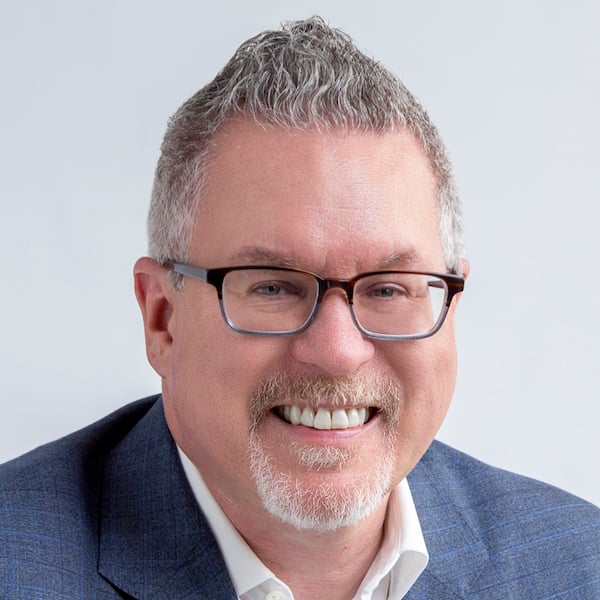
Written by Mark Graban
Mark Graban has served healthcare clients since 2005. Mark is internationally recognized as a leading author and speaker on Lean healthcare. His latest book is "The Mistakes That Make Us: Cultivating a Culture of Learning and Innovation."


Submit a comment